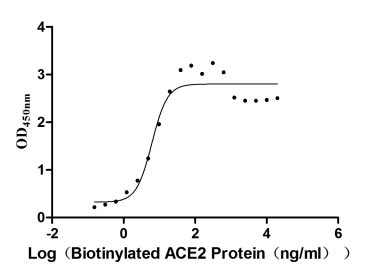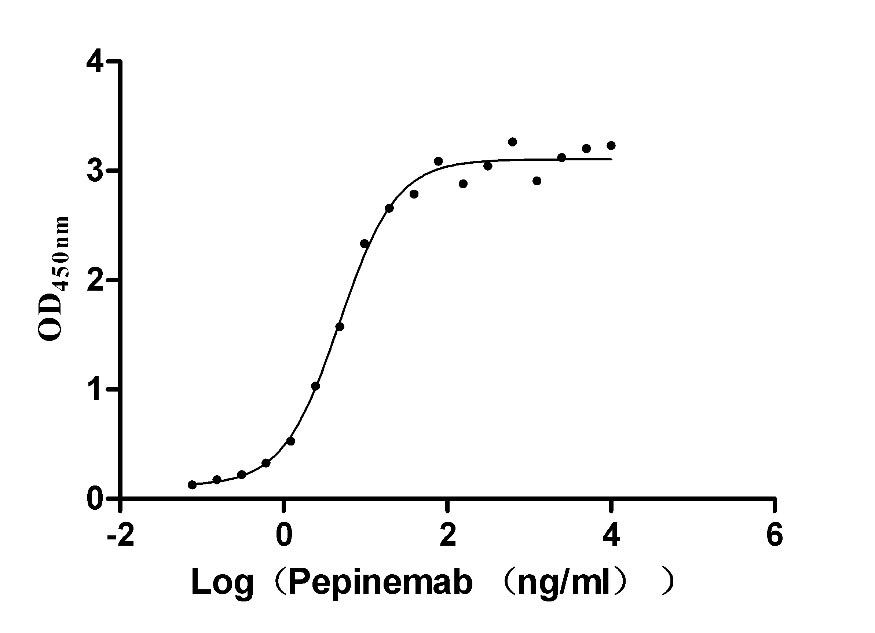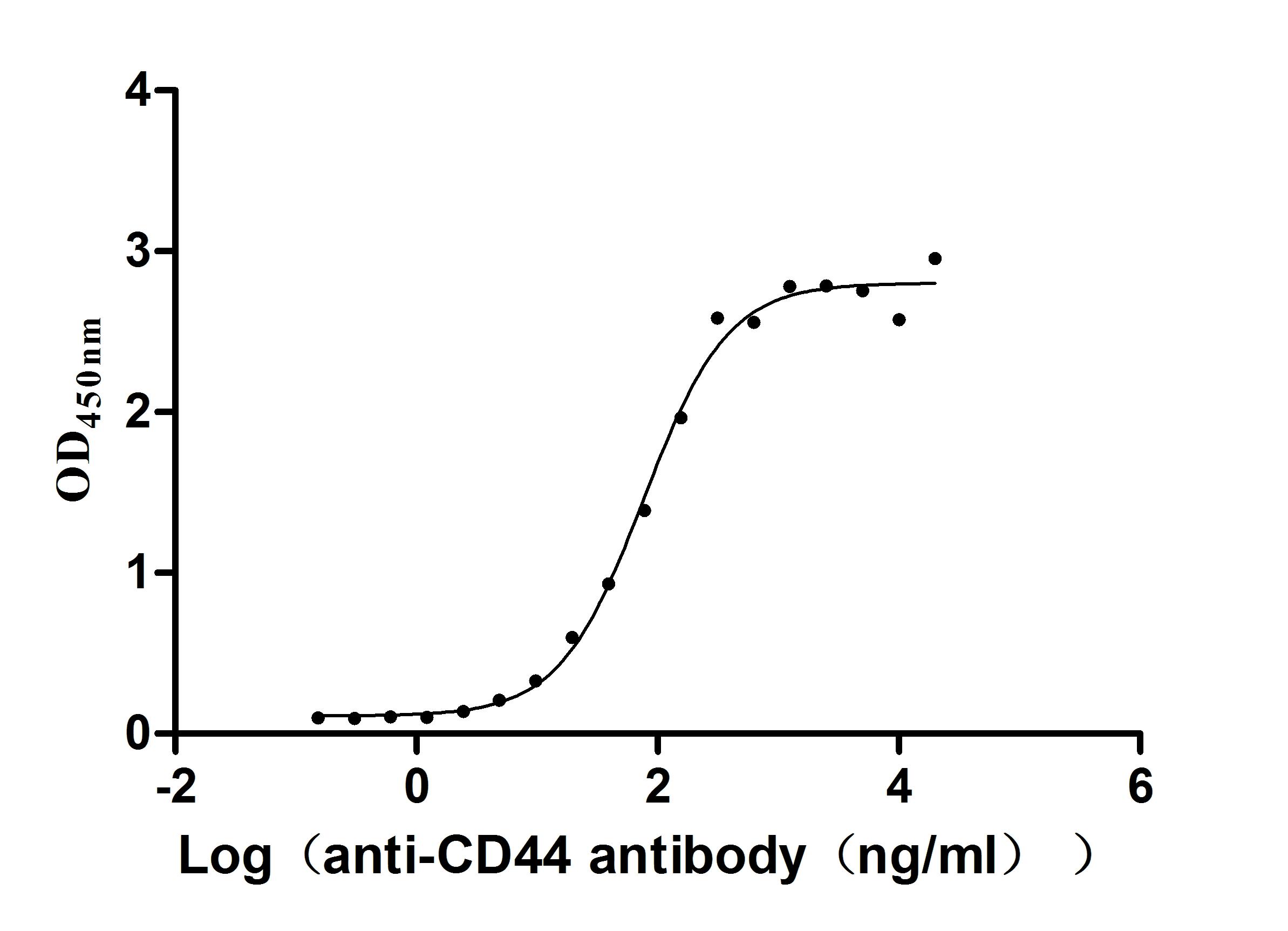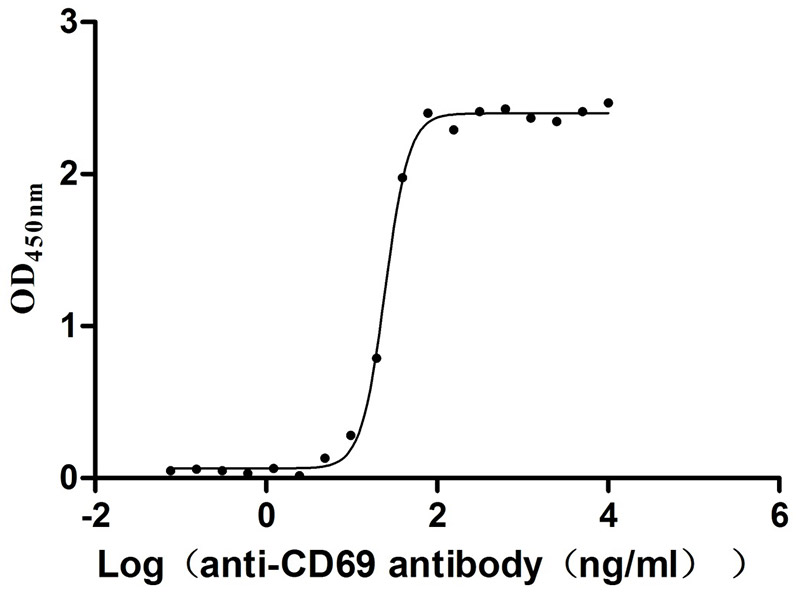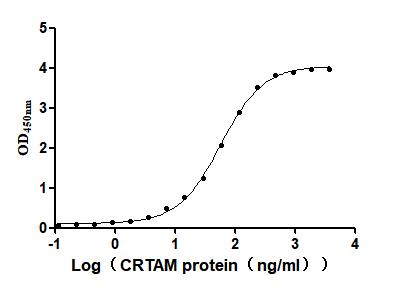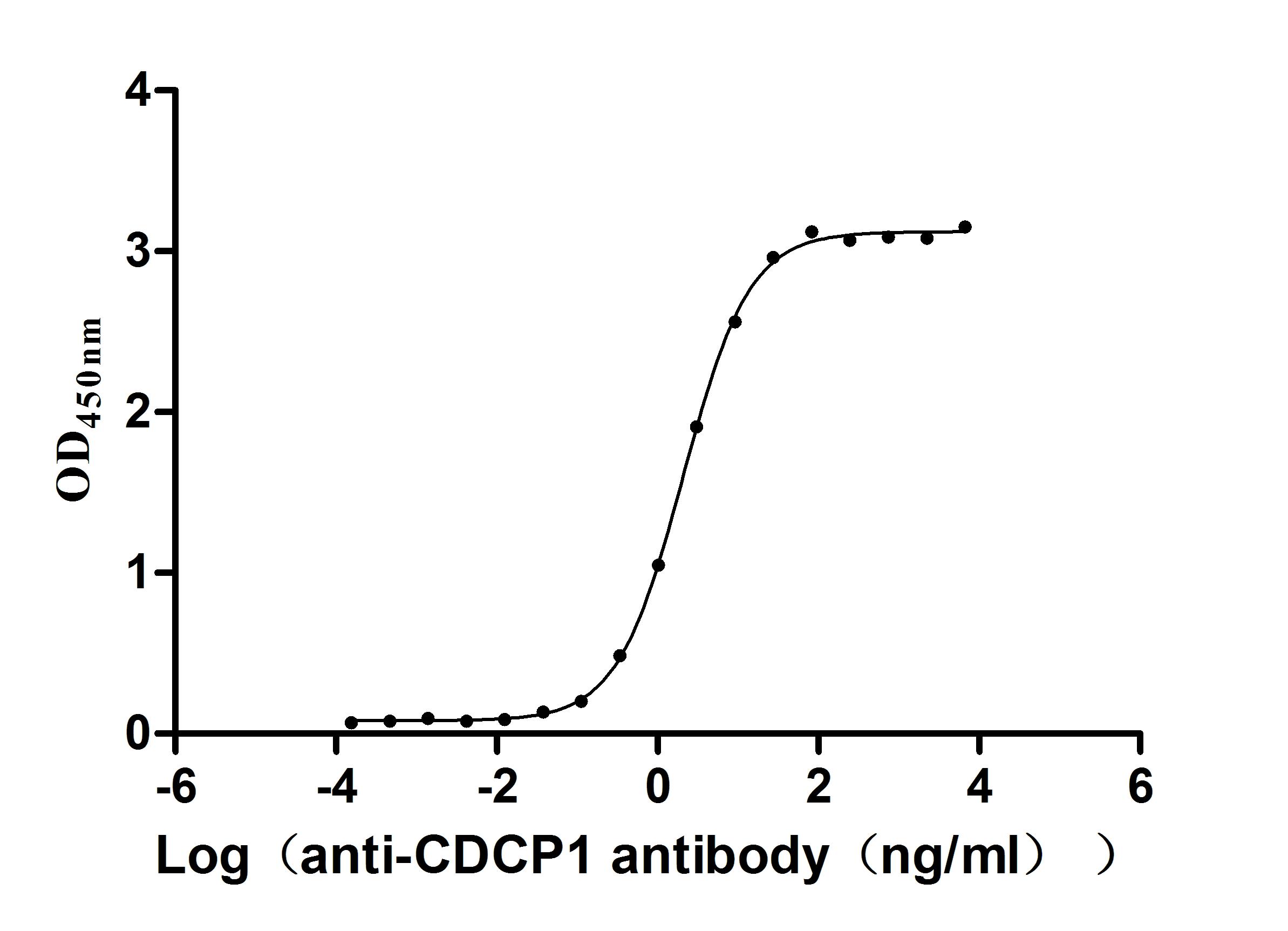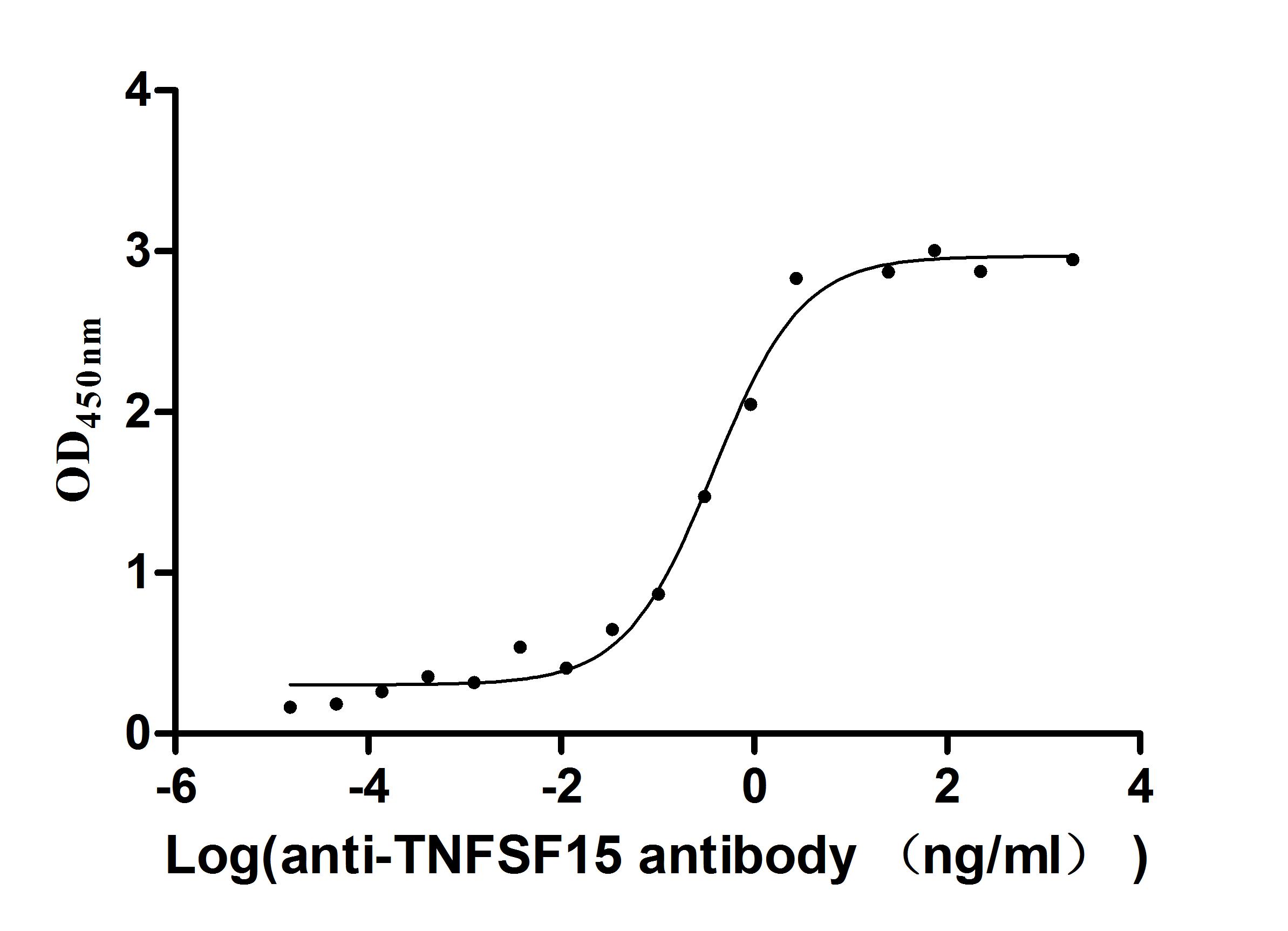Recombinant Mouse Transforming growth factor beta receptor type 3 (Tgfbr3), partial
-
货号:CSB-YP023453MO
-
规格:
-
来源:Yeast
-
其他:
-
货号:CSB-EP023453MO
-
规格:
-
来源:E.coli
-
其他:
-
货号:CSB-EP023453MO-B
-
规格:
-
来源:E.coli
-
共轭:Avi-tag Biotinylated
E. coli biotin ligase (BirA) is highly specific in covalently attaching biotin to the 15 amino acid AviTag peptide. This recombinant protein was biotinylated in vivo by AviTag-BirA technology, which method is BriA catalyzes amide linkage between the biotin and the specific lysine of the AviTag.
-
其他:
-
货号:CSB-BP023453MO
-
规格:
-
来源:Baculovirus
-
其他:
-
货号:CSB-MP023453MO
-
规格:
-
来源:Mammalian cell
-
其他:
产品详情
-
纯度:>85% (SDS-PAGE)
-
基因名:Tgfbr3
-
Uniprot No.:
-
别名:Tgfbr3; Transforming growth factor beta receptor type 3; TGF-beta receptor type 3; TGFR-3; Betaglycan; Transforming growth factor beta receptor III; TGF-beta receptor type III
-
种属:Mus musculus (Mouse)
-
蛋白长度:Partial
-
蛋白标签:Tag type will be determined during the manufacturing process.
The tag type will be determined during production process. If you have specified tag type, please tell us and we will develop the specified tag preferentially. -
产品提供形式:Lyophilized powder
Note: We will preferentially ship the format that we have in stock, however, if you have any special requirement for the format, please remark your requirement when placing the order, we will prepare according to your demand. -
复溶:We recommend that this vial be briefly centrifuged prior to opening to bring the contents to the bottom. Please reconstitute protein in deionized sterile water to a concentration of 0.1-1.0 mg/mL.We recommend to add 5-50% of glycerol (final concentration) and aliquot for long-term storage at -20℃/-80℃. Our default final concentration of glycerol is 50%. Customers could use it as reference.
-
储存条件:Store at -20°C/-80°C upon receipt, aliquoting is necessary for mutiple use. Avoid repeated freeze-thaw cycles.
-
保质期:The shelf life is related to many factors, storage state, buffer ingredients, storage temperature and the stability of the protein itself.
Generally, the shelf life of liquid form is 6 months at -20°C/-80°C. The shelf life of lyophilized form is 12 months at -20°C/-80°C. -
货期:Delivery time may differ from different purchasing way or location, please kindly consult your local distributors for specific delivery time.Note: All of our proteins are default shipped with normal blue ice packs, if you request to ship with dry ice, please communicate with us in advance and extra fees will be charged.
-
注意事项:Repeated freezing and thawing is not recommended. Store working aliquots at 4°C for up to one week.
-
Datasheet :Please contact us to get it.
相关产品
靶点详情
-
功能:Binds to TGF-beta. Could be involved in capturing and retaining TGF-beta for presentation to the signaling receptors.
-
基因功能参考文献:
- TGFbetaR3 promotes apoptosis of cardiomyocytes via a p38 pathway-associated mechanism, and loss of TGFbetaR3 reduces myocardial infarction injury. PMID: 28559372
- describe a detailed characterization of TbetaRIII expression in lymphocyte subpopulations demonstrating that this co-receptor is significantly expressed in T but not B lymphocytes and among them, preferentially expressed on naive and central memory T cells PMID: 29050936
- Study identified a novel major binding site for TGF-beta-like growth factors in TGFR-3. Findings potentially provide novel experimental insight into the general function of zona pellucida domain-containing proteins. PMID: 23826237
- a signaling pathway important in epicardial cell behavior downstream of TGFbetaR3 PMID: 27505173
- Retinoic acid enhanced TbetaRIII expression and that this increase contributed to LF-stimulated IgA production. PMID: 26277894
- These data reveal a critical, previously unrecognized role for TGFbetaR3 in vascular and osteoblast development during palatogenesis. PMID: 25382630
- These data demonstrate that TbetaRIII regulates BMP-mediated signaling and biological effects, primarily through the ligand sequestration effects of sTbetaRIII in normal and cancerous mammary epithelial cells. PMID: 25077702
- TGFBR3 mediated suppression of cancer progression includes effects on the tumor immune microenvironment. PMID: 23925295
- Loss of Tgfbr3 compromises the functions of TGFbeta2 in the differentiating fetal testis. PMID: 23303681
- A novel reciprocal loop between miR-21 and TGFbetaRIII in cardiac fibrosis caused by myocardial infarction in mice. PMID: 22960625
- These data suggest that Inhibins and TbetaRIII may function as a molecular pair regulating T cell development. PMID: 22952931
- the relative roles of TGFbetaR3-dependent and -independent signaling in the actions of BMP2 on epicardial cell behavior and demonstrate the critical role of TGFbetaR3 in mediating BMP2-stimulated invasion. PMID: 22237159
- used intact embryos and epicardial cells from E11.5 mouse embryos to reveal the mechanisms by which TGFbetaR3 signals and regulates epicardial cell behavior PMID: 21871877
- TGFBR3 can prevent hypoxia-induced injury in neonatal mice cardiac fibroblasts by negative regulation of TGF-beta signaling. PMID: 21792916
- Data present the 2.0-A resolution crystal structure of the betaglycan ZP-C region in combination with a downstream region known as the external hydrophobic patch. PMID: 21402931
- Tgfbr3 is associated with acute lung injury PMID: 21297076
- TbetaRIII enhanced both ALK3 & ALK6 signaling. TbetaRIII mediates differential ALK3 and ALK6 subcellular trafficking resulting in distinct signaling downstream of ALK3 and ALK6. PMID: 19726563
- required for normal seminiferous cord formation, normal fetal Leydig cell development, and the establishment of fetal testis endocrine function PMID: 19696014
- These results indicate that betaglycan expression is up-regulated during myogenesis and that MyoD and RA modulate its expression by a mechanism that is independent of myogenin. PMID: 12399463
- TbetaRIII is an important modulator of TGFbeta2 function in embryonic fibroblasts and reduced sensitivity to TGFbeta2 may underlie aspects of the TbetaRIII mutant phenotype PMID: 12773577
- TbetaRIII is not required for TGF-beta2 to signal when sufficient TGF-beta2, TbetaRI, and TbetaRII or TbetaRII-B are present PMID: 14996829
- TbetaRIII appeared to inhibit mammary tumor invasion by undergoing ectodomain shedding and producing soluble TbetaRIII. PMID: 17160136
- Tgfbr3 is required for coronary vessel development and embryonic viability. PMID: 17704211
- These data indicate that TbetaRIII acts as a tumor suppressor in nontumorigenic mammary epithelial cells at least in part by inhibiting NFkappaB-mediated repression of E-cadherin. PMID: 17823118
- Pronounced changes in the expression and localization of the TGF-beta receptors Tgfbr3 were noted as mouse lungs progressed through the canalicular, saccular, and alveolar stages of development. PMID: 18095342
- expressed at higher levels in the developing testis compared to ovary PMID: 18236212
- These results demonstrated that endocrine effects of inhibin as a negative feedback controller of follicle stimulating hormone production in gonadotropes are dependent on betaglycan expression. PMID: 19524135
显示更多
收起更多
-
亚细胞定位:Cell membrane; Single-pass type I membrane protein. Secreted. Secreted, extracellular space, extracellular matrix.
-
数据库链接:
KEGG: mmu:21814
STRING: 10090.ENSMUSP00000031224
UniGene: Mm.200775
Most popular with customers
-
Recombinant Human Angiotensin-converting enzyme 2 (ACE2), partial,Biotinylated (Active)
Express system: Mammalian cell
Species: Homo sapiens (Human)
-
Recombinant Human Semaphorin-4D (SEMA4D), partial (Active)
Express system: Mammalian cell
Species: Homo sapiens (Human)
-
Recombinant Macaca fascicularis CD44 antigen (CD44), partial (Active)
Express system: Mammalian cell
Species: Macaca fascicularis (Crab-eating macaque) (Cynomolgus monkey)
-
Recombinant Human Early activation antigen CD69 (CD69), partial (Active)
Express system: Mammalian cell
Species: Homo sapiens (Human)
-
Recombinant Mouse Cytotoxic and regulatory T-cell molecule (Crtam), partial (Active)
Express system: Mammalian cell
Species: Mus musculus (Mouse)
-
Recombinant Macaca fascicularis CUB domain containing protein 1 (CDCP1), partial (Active)
Express system: Mammalian cell
Species: Macaca fascicularis (Crab-eating macaque) (Cynomolgus monkey)
-
Express system: Mammalian cell
Species: Homo sapiens (Human)


